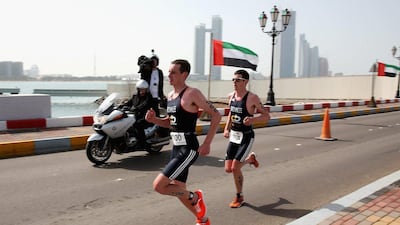All through the 111.5km of the Abu Dhabi International Triathlon short course, Alistair and Jonathan Brownlee hung with each other shoulder to shoulder. There was a second between them in the 1.5km swim; Alistair, the elder, was ahead. There was nothing between them in the 100km cycling leg. Jonny made up that second in the second transition from the cycles to running.
By the time of the 10km run, the brothers had built up a near five-minute lead on the rest of the pack and a zero-second lead between each other. As they ran into the Corniche on the final kilometre, Alistair was a shoulder ahead, but the strain was showing. Jonny, who had never beaten him (“in a proper race,” according to Alistair ahead of the triathlon), was looking untroubled.
Here, everyone thought and expected and probably really hoped, would come the final kick. One brother would pull away and push, win and who knows, maybe spark a family feud. Instead, as they came to the final few metres, they pulled out a Yorkshire flag and brandishing it together, crossed the finish line together in joint first place: three hours, 12 minutes and 21 seconds and not a millisecond to separate them.
For Alistair it amounted to a defence of his title win from last year. It is apparently a bit of a family party trick. “We have finished like that lots of times,” said Jonny. “In domestic races we have. Once in 2011 in Madrid in one of the world series races we did it for the first time. Alistair dropped me that time and then waited for me. So we’ve done it a few times.”
The reasons were prosaic enough. It was the first triathlon of the season. It had become pretty hot by the time the brothers got on their bikes and with Jonny competing in Auckland in three weeks time, it made sense to not push each other completely. Both had been suffering from stomach bugs earlier in the week as well.
Still, the urge to ask each who would have won had they not decided to finish together could not be resisted. “Of course I would have,” said Alistair, a man who wears his sense of humour lightly. “I like to think that and so should Johnny.”
The younger sibling thought differently though but would also appear to be the more deferential, judging by this response. “Alistair would probably have pushed harder on the bike. Maybe on the run I would’ve pushed a little bit more. But I don’t know, it’s hard to tell. Alistair is always tough so I doubt I would’ve beaten him.” In agreement, together, still not separated.
The heat, both acknowledged, made the race that much tougher. Though the morning dawned beautifully and brought mild temperatures, by the time most competitors were transitioning to their cycles, temperatures were rising and with a degree of menace.
By the time they finished their run, it was properly hot and an entire world away from the sub-zero temperatures they were used to at their Yorkshire homes. “It’s hot,” said Jonny minutes after finishing and it wasn’t even 11 then.
“I haven’t been away training. We went to Spain for a little bit but we’ve been in Yorkshire where it’s minus-something so it’s completely different from here. It got pretty hot towards the end and I poured lots of water on my head at that point. It’s a good way to train you differently in the winter.
“Today I just wanted to stay as close as I could to him. We’ve been doing a lot of bike sessions and I know he’s better than me on the bike. I just wanted to let him set the pace which was really tough. It’s a tough, tough race and its hot and we have a long season ahead. but we really enjoyed it.”
Unlike Jonny, for whom this was the first time in Abu Dhabi, Alistair is a veteran visitor. This was, he said, his third trip in the last 18 months (and second time competing). The clear sense, after he finished, was that he enjoyed the scenery around him as much as the competition itself.
“It was really good racing today. I always enjoy coming here. It was a fantastic start to the whole day, just as the sun was coming up against this beautiful water. We swam as hard as we could, jumped up on our bikes and the course was straight out on the highway and to get to the F1 circuit, which was really cool.
“The course is a bit different from last year, as we did two laps at the Yas Marina circuit and I really enjoyed that a lot more. That F1 circuit is a real highlight. It’s incredible how fast things move in Abu Dhabi. Whole buildings have gone up in the time since I was last here. It’s fantastic because everything here is big and impressive, the race is big and impressive too.”
Follow us on Twitter @SprtNationalUAE

